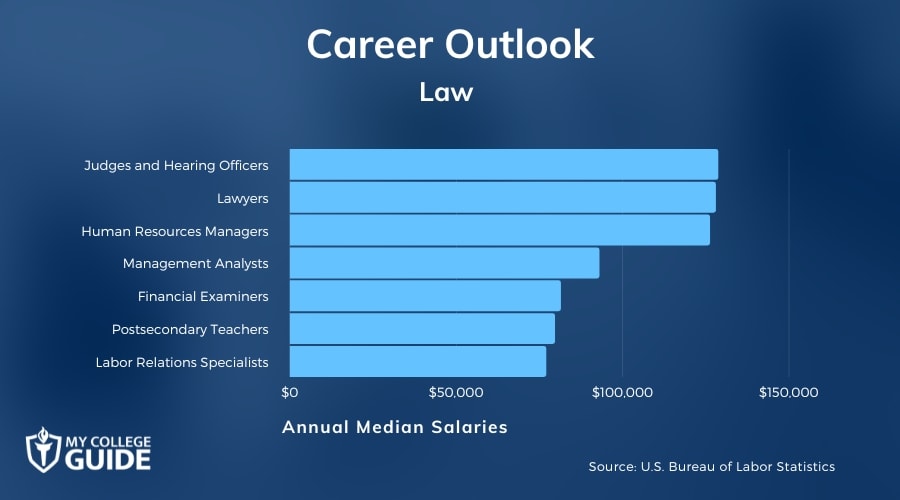If you’re interested in federal, state, and local laws and want to help individuals navigate the court system, learning about online law schools can help you get started in the right direction.

Most states, but not all, require students to attend an on-campus, ABA-accredited program in order to sit for the bar exam and become licensed, so it is very important that you understand the requirements and limitations before choosing the right online program for your career goals.
Editorial Listing ShortCode:
Let’s take a closer look at the ins and outs of online law degrees to determine whether they’re a good option for you and your future.
Online Law Schools

More and more students are searching for online schools for law. Not only can a law degree be appropriate for those who wish to participate in the criminal defense system made famous by television and movies, but it can be a practical addition to many professionals’ education.
Editorial Listing ShortCode:
Those who attend law school will be introduced not only to the nuances of law and order but can receive additional training in areas such as:
- Compliance
- Ethics
- Tort Law
- Tax and Financial Regulations
- Negotiation
- Business and Employment Law
- Contracts
- Arbitration
- Legal System Proceedings
- Legal Theory
Students are able to select from the types of law degrees that best match their interests and career goals. As a result, those who pursue their online law degree are more than aspiring lawyers and judges.
You will also have access to student services such as:
- Extensive law libraries, textbooks, and other reference materials
- Academic advising to ensure your courses match your career goals
- Online tutoring
- Opportunities to enrich your law degree program with workshops, seminars, and live lectures
- Courses to prepare you for the bar exam
For those who work in fields in which laws and regulations must be accurately obeyed, studying law online has the ability to provide extra insight and understanding into policies, as well as interpretation of future laws. While a law degree may not be a requirement for certain careers, more and more students are finding it advantageous to study online law programs that can help them in their current career path.
Types of Law Degrees

It is a common misconception that all law degrees are the same. In fact, there are five different types of law degrees, each of which has a different area of focus. As a result, prospective law students are able to select a degree program that aligns with their career goals.
The five types of law degrees include:
- Master of Dispute Resolution (MDR): As the name implies, someone with an MDR law degree works specifically in resolving conflict and mediation. MDR students learn how to resolve disputes and mediate disagreements, as well as the arts of negotiation and conflict management.
- Master of Legal Studies (MLS): Those who earn their MLS are considered experts in the law and legal processes. Throughout their studies, MLS students learn about legal procedures, interpretation of the law, ethics, and legal strategies, which can help them in compliance-oriented careers.
- Master of Laws (LLM): The LLM degree is received in addition to a law degree, and allows students to specialize in a certain area of law. Students may choose an LLM to focus on a particular type of law, such as copyright law or tax law.
- Juris Doctor (JD): Students who receive their JD typically plan to pursue a career as a lawyer or judge. The JD curriculum prepares students to take the American Bar Association exam in order to become a practicing lawyer.
- Doctor of Juridical Science (SJD): Considered the highest possible law degree, the SJD is offered to those who have earned their JD or LLM. SJD students frequently pursue this degree in order to become legal educators, researchers, or scientists.
Each type of law degree provides students with a specialized focus on law, theory, and practice, allowing students to choose online law school programs that best suit their professional aspirations.
Law Careers & Salaries

While many people associate law degrees with becoming a lawyer, there are many different professionals who can benefit from completing online law school programs.
Editorial Listing ShortCode:
Those who work in highly regulated fields, such as human resources managers, financial examiners, and tax specialists can benefit from the MLS program. Similarly, management analysts and arbitrators, mediators, and conciliators may find an MDR program helpful in their careers.
According to the U.S. Bureau of Labor Statistics (BLS), job opportunities for lawyers are anticipated to grow by 10% over the coming 10 years.
| Careers | Annual Median Salaries |
| Judges and Hearing Officers | $128,710 |
| Lawyers | $127,990 |
| Human Resources Managers | $126,230 |
| Management Analysts | $93,000 |
| Financial Examiners | $81,410 |
| Postsecondary Teachers | $79,640 |
| Labor Relations Specialists | $77,010 |
| Private Detectives and Investigators | $59,380 |
| Tax Examiners Collectors, and Revenue Agents | $56,780 |
| Arbitrators, Mediators, and Conciliators | $49,410 |
There are many paths in which the courses studied at an online school for law, depending on the type of degree program you pursue, and your long-term career goals.
Law Curriculum & Courses

The courses you may encounter through law schools with online programs can differ based on the type of law degree you plan to pursue.
Some common core courses that many students may study include:
- United States Law: This course provides students with insight into the Federal law of the United States, including the application of these laws.
- Modern Analysis and Interpretation of Law: In this course, students learn the theory and history behind current laws, and how they can be used to establish a just decision.
- Criminal Law: Students who wish to understand more about crime, punishment, and criminal defense may take this course.
- Criminal Procedures: This course highlights the steps taken by the justice system as well as the methodology behind the process.
- Fundamentals of Contracts: Students will learn about different types of contracts, how they may be enforced, and which agencies enforce them.
- Principles of Negotiation: In this course, students learn how to set the stage and conduct successful negotiation strategies.
- Cybersecurity and Privacy Law: This course will examine how the law is established and enforced in an electronic setting.
- Employment Law: In this course, students will review the various Federal laws impacting employment, as well as how state and local laws are created and enforced.
- Compliance: This course introduces the concept of compliance, including best practices, as well as federal and state regulation of minimum internal control standards.
- Legal Theory: In this course, students explore how laws are formed, as well as how laws have changed over time.
In addition to certain core courses, you will likely be asked to select elective classes related to your chosen concentration in the field of law.
How to Choose an Online Law School

Choosing an online law degree program that is right for you takes careful consideration of many different factors.
- Accreditation: Accreditation is important in the legal field so it’s important to check if the school you are interested in is accredited by one of the regional accrediting agencies.
- Student Services: Students taking online law courses should receive the same student support as traditional, on-campus students.
- Cost: The price of law school can be a deciding factor when choosing the right school for you. It’s a good idea to compare the various costs to attend each school you are interested in and inquire to see what each school offers in terms of financial aid.
- Admission Requirements: Most law schools will require you to have an undergraduate degree, take an admissions test, like the LSAT or GRE, offer letters of recommendation and possibly submit a resume and personal statement.
These are some of the aspects to consider when choosing the right online law school but ultimately the choice will depend on your personal and academic needs.
Admissions Requirements

The exact requirements to gain admission to an online law school program vary by school. Typically, you will need the following:
- An undergraduate degree (B.A. or B.S.) in any field
- To pass the Law School Admission Test (LSAT)
- Graduate Record Examinations (GRE)/Graduate Management Admission Test (GMAT) test scores (if required, as only some schools now require this)
- Letters of recommendation
- Personal statement
A growing number of schools no longer require GRE/GMAT scores for graduate admissions. It’s a good idea to check with the program or programs you’re interested in to see what their specific requirements are.
Accreditation

While online learning is a popular option around the world, the American Bar Association (ABA) has only approved a handful of fully online law schools as officially accredited. There are many hybrid and traditional schools that offer ABA-accredited programs.
There are also online law schools that are regionally accredited, which means the program must pass a rigorous assessment that evaluates academic quality. You can check to see if your school of choice is accredited by visiting the U.S. Department of Education’s website.
Editorial Listing ShortCode:
If you decide to attend an online school accredited by the ABA, you will be eligible to sit for a bar exam in any state. By choosing a regionally accredited school, you will be able to sit for the bar exam in your particular state.
Financial Aid and Scholarships

For those who are interested in opportunities to help offset the cost of law schools with online programs, the first step in obtaining needs-based assistance is the completion of the Free Application for Federal Student Aid (FAFSA).
The FAFSA can help determine if you are eligible for Federal student aid. Other opportunities for financial assistance can include scholarships and grants offered directly by the school itself. These may be issued in recognition of academic accomplishments or financial status. Check with each school for more details.
Some employers also offer tuition reimbursement or educational assistance for students who wish to continue their education, especially in a job-related field. Private grants may also be offered by community or professional organizations.
What Degree Do You Need to Get Into Law School?

In most cases, candidates of law schools with online programs are asked to have completed at least bachelor-level education.
Most online law school programs do not require a specific undergraduate degree for entry. In fact, many schools encourage students from a variety of backgrounds to apply for law school, as different careers and perspectives can benefit from a solid knowledge of the various laws.
It is likely that your undergraduate transcripts will be examined to consider your academic performance and coursework, in order to determine if any pre-requisite courses should be taken before beginning your law studies.
What Can You Do With a Law Degree?

While many students who complete a Juris Doctor degree go on to become lawyers and judges, there are actually many careers in which a law degree can be beneficial.
Those who work in certain areas of business, such as human resources, finance, and labor relations may wish to have an intense background in the legal and ethical issues they face to ensure compliance. Some individuals who study the law go on to become educators in their field, while others use their understanding of the law to bolster careers in law enforcement or mediation.
How Much Do Lawyers Make Right Out of Law School?

It’s no secret that lawyers make great money, but how soon can you expect to see those earnings? According to data from the BLS, lawyers may earn an annual median salary of $127,990.
Editorial Listing ShortCode:
Paralegals can enjoy a median salary of $56,230 while lawyers practicing within the local government have the potential to earn around $100,240 per year. The BLS projects a 10% growth for lawyers over the next decade, faster than the average for all occupations. Depending on the employer, you may need additional work experience to qualify for some of these jobs.
What Is the Quickest Way to Get a Law Degree?

Traditionally, it takes about seven years to earn a law degree – four years for the undergraduate degree (B.A. or B.S.) and another three for the law degree (J.D.).
You can speed up the process by considering the following:
- Online education: By completing your undergraduate education online and/or choosing an accelerated J.D. program, you may be able to shave a year off the process.
- Consider a “3+3” program: Some schools offer a combination program, where students spend three years earning their B.A./B.S. and the next three earning their J.D.
If you plan wisely and work hard, it may be possible to earn your law degree in less than the typical seven years from start to finish.
Can You Get a Law Degree Online?

Most degree types can be obtained from law schools online. Those who are interested in online JD programs will need to carefully consider the online law schools approved by ABA. Many of these programs include a hybrid of online and in-person learning in accordance with the ABA’s requirements.
Online schools for law can provide a variety of law degrees for those who do not intend to sit for the bar exam, such as MDR, MLS, and LLM degrees.
How Long is Law School?
The length of time it takes to earn your law degree depends on the type of degree you wish to earn.
Here are some common timelines:
- Master of Dispute Resolution (MDR): approximately 2 years of study
- Master of Legal Studies (MLS): 1 to 3 years of full-time study
- Master of Laws (LLM): 1-2 years
- Juris Doctor (JD): 3-5 years of full-time study
- Doctor of Juridical Science (SJD): 2 years of full-time study, including seminars and research
Part-time studies may increase the amount of time it takes to get your degree.
Is Online Law School Difficult?

Law school may be difficult, depending on your interests and skills.
You can expect to take some common core courses throughout law school including:
- Civil Procedure
- Constitutional Law
- Criminal Law and Procedure
- Property Law
You’ll also learn about contracts, torts, and legal research and writing to build the skills required in law professions. Law school is a rigorous, fast-paced, and highly competitive environment.
Can I Practice Law With an Online Law Degree?

In order to practice law, you have to pass a state bar exam, and the requirements you must meet in order to take that exam vary by state.
Each state sets its own conditions in order to be eligible for the bar exam. According to the ABA admission guidelines, only a handful of states currently allow students who have completed online programs to sit for the bar exam, but most have additional strict limitations.
Editorial Listing ShortCode:
Graduates of an online law degree program can sit for a bar exam in one particular state, while graduates from an ABA-accredited school can sit for the bar in any state. The ABA has accredited and approved 199 institutions and programs throughout the United States.
What Else Can I Do With an Online Law Degree?
If you are unable to become licensed in your state or no longer want to be a practicing attorney, your online law degree can help you find employment in related fields. For example, you may be able to pursue a career as a paralegal, legal assistant, mediator, or court reporter.
You may also want to opt to find work in politics or criminal justice. You could also use your skills to become a legal writer or perhaps go into teaching using your skills to teach the next generation of lawyers.
Are there any ABA Accredited Online Law Degrees?

While online learning is a popular option around the world, the ABA has been slow to get on board. There are now several online and hybrid online law degree programs offered by ABA-approved law schools via various distance learning programs.
A hybrid program allows students to complete the bulk of their education online, and then finish the degree with some concentrated on-campus residencies over the course of a few days, or via in-person night classes. Fully online programs offer flexibility and the opportunity to study on your own schedule but interact with students and professors virtually.
Editorial Listing ShortCode:
Obtaining law degrees online allows students to maintain their jobs and other obligations while finishing their online law degrees.
Can I Take the Bar Exam Without Going to Law School?

In a few states, for those without online accredited law degrees, it is still possible to sit for the bar exam.
To take the bar exam without going to law school, follow these steps:
- Check with Your State: Check to see if your state allows those without a law degree to take the bar exam. There are only a handful of states that allow this process.
- Apprenticeship: In order to qualify for the bar exam without a degree, you will likely have to work as a legal apprentice under the guidance of a practicing lawyer for a certain number of hours.
- Pass an Exam: Some states will require that you pass the First-Year Law Students’ Examination after your apprenticeship.
- Prepare to Take the Bar Exam: After you have completed your apprenticeship and passed any prerequisite exams, you can now prepare to take the bar exam.
Keep in mind, each state varies with its requirements for the bar exam. Check the ABA’s website for more information as to which states allow you to take the bar exam without a law degree from an accredited online law school.
Is Law School Worth it?

Yes, law school is worth it for many professionals. While career opportunities for professional lawyers are on the rise, according to the Bureau of Labor Statistics, there are many other fields in which earning a law degree can be beneficial.
Not only are there opportunities to focus on law particular to your fields, such as employment or taxation, but you may also discover that a deep dive into federal law can give you greater insight into your current career. The growth outlook according to the BLS is positive for lawyers. The field is expected to see a 10% percent growth over the next 10 years.
Editorial Listing ShortCode:
Lawyers earn an annual median salary of $127,990 making it a very lucrative career option. As a result, more professionals than ever are considering online law degree schools.
Best Online Law Schools
Methodology: The following school list is in alphabetical order. To be included, a college or university must be regionally accredited and offer degree programs online or in a hybrid format.

California Southern University offers four different online law degree programs. Some programs can potentially be finished in 18 months when taking full-time classes. The curriculum is designed to prepare students for their First-Year Law Examinations and the California Bar. Programs offered include a Master of Laws and Juris Doctor.
California Southern University is accredited by the Higher Learning Commission.

Emory University offers two online law degrees: a Juris Masters (JM) and a Master of Laws (LLM). The LLM requires the completion of 24 credit hours. The JM can potentially be completed in 18 months. It’s mostly online but does require three residencies. Online students may take some on-campus courses. Online courses are 7 weeks long and asynchronous.
Emory University is accredited by the Southern Association of Colleges and Schools Commission on Colleges.

Hodges University offers a BS in Legal Studies. The program requires the completion of 120 credit hours and is offered entirely online. There are start dates offered every month. Courses are taught by experienced lawyers. Graduates often move on to get law degrees or other masters in the legal field.
Hodges University is accredited by the Southern Association of Colleges and Schools Commission on Colleges.

Liberty University offers online law degree options for undergraduate and graduate students. Undergraduates can earn an Associate or a Bachelor’s in Paralegal Studies. Graduate students can earn a Juris Master entirely online. They can choose from several different concentrations, including Compliance, Health Law, and American Legal Studies. Liberty also offers a Master of Laws degree that can be earned online.
Liberty University is accredited by the Southern Association of Colleges and Schools Commission on Colleges.

Loyola University—Chicago offers several law degrees for online students. Students seeking a BA in Paralegal Studies may complete a blended program. Students pursuing an LLM can choose from concentrations like Child and Family Law or Business. These programs are fully online and require around 24 credits for completion. Most also require a thesis.
Loyola University – Chicago is accredited by the Higher Learning Commission.

U.S. News & World Report ranked Pepperdine University as the 31st grad school for a law degree in Dispute Resolution. Students may also earn a Master’s in Legal Studies or pursue a dual degree. Courses start in January, May, and September. Most programs require 32 credits for completion. Pepperdine offers career support for graduates.
Pepperdine University is accredited by the WASC Senior College and University Commission.

Seton Hall University offers an online program for a Masters of Legal Studies for students who aren’t pursuing a law degree but plan to work in a legal capacity. Students can choose from the general degree or choose from one of five concentrations. Concentrations offered include Health and Hospital Law and Financial Services Compliance. The course’s assignments are completed in weekly modules.
Seton Hall University is accredited by the Middle States Commission on Higher Education.

Villanova University offers an online program for an LLM in Taxation designed for students who already have law degrees. The program requires the completion of 24 credits and can potentially be finished in just 24 months. Courses are offered entirely online but can be taken on campus. Each course is 8 weeks long and meets synchronously in the evenings.
Villanova University is accredited by the Middle States Commission on Higher Education.

Students at Wake Forest University can earn a Master of Studies in Law (MSL). The MSL is designed for students not planning to practice law. The program is entirely online and asynchronous. Classes follow a semester schedule and start three times per year. Students can choose from three professional tracks, including Business Law and Compliance.
Wake Forest University is accredited by the Southern Association of Colleges and Schools Commission on Colleges.

U.S. News & World Report ranked Washington University in St. Louis as one of the best grad schools for law degrees. Online students can choose from two law degrees: an MLS or an LLM. Students may opt for a concentration in Taxation. Courses are synchronous with weekly meetings. Students have the option to attend weekend immersions.
Washington University in St. Louis is accredited by the Higher Learning Commission.
Getting Into Law School Online

For those who have an interest in examining and interpreting the law, applying to online lawyer degree programs can be very exciting.
Since there are several different types of law degrees offered, it’s a good idea to take a look at all of the accredited programs offered to make a choice that best fits your professional goals. From there, you can select a concentration and focus within your program to help fit your career path, providing you with extra knowledge and insight into the fascinating field of law.
Take a look at some of the programs currently offered to get started on your next exciting educational step!
